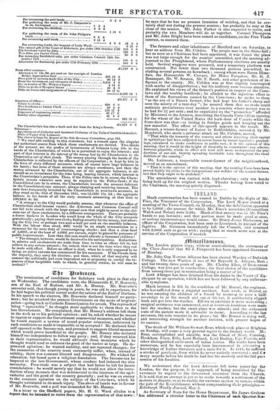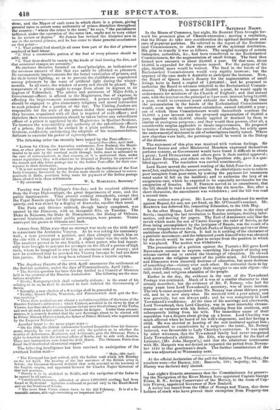Arflistellaneotts.
The London papers copy, without contradiction, the statement of the Clare Journal that Sir J. Fitzgerald has been appointed Governor of Bombay.
Mr. John Gay Newton Alleyne has been elected Warden of Dulwich College. The new Warden is son of Sir Reynold A. Alleyne, Bart. ; and but twenty-three years of age. Mr. Charles Allen, of Brazennose College, was also put in nomination ; the final choice of the candidates from among those put in nomination being a matter of lot.
Lord Abioger has been detained from his duties in the Court of Ex- chequer by an operation, which has not been followed by any unfavour- able symptoms.
Much interest is felt in the condition of Mr. Brunel, the engineer, who has suffered from a singular accident. Last week, at Bristol, as he was amusing the children of a friend by seeming to pass a half- sovereign in at his mouth and out at his ear, it accidentally slipped back and got into the trachea, Efforts to extricate it were unavailing ; surgical assistance was summoned, and at intervals incisions were made into the trachea, but the exact place was missed ; and the exhausted state of the patient made it advisable to desist. According to the last accounts, the coin remains in its place ; hut Mr. Brunel is doing well, and recovering strength for another incision, with greater hopes of' its success.
The death of Mr.William Stewart Rose, which took place at Brighton on Sunday, will cause a very general regret in the literary world. Mr. Rose, accomplished and amiable, was the friend of Scott, Canning, Hookham Frere, Ellis, Lord Holland, Lord Dudley, Ugn Foscolo, and other distinguished cultivators of belles lettres. His works have been numerous, and he has especially been instrumental in advancing a knowledge of Italian literature and a taste for it. In 1818, he suffered a stroke of paralysis, from which he never entirely recovered ; and fir many months before his death he had lost his memory and the full pot- session of his faculties.
We understand that the Lord Advocate left town yesterday for London, for the purpose, it is supposed, of being consulted by Go- vernment in regard to the threatened secession from the Church. It is said that an attempt is yet to be made towards a settlement of the matters in dispute, so as to enable the extreme section to remain within the pale of the Establishment without compromising their principles.— Edinburgh Weekly Journal, May 3.
As Secretary of State for the Home Department, Sir James Graham has addressed a circular letter to the Chairman of each QuArter-Sts-
sions, and the Mayor of each town in which there is a prison, giving general miles to secure some uniformity of prison discipline throughout the country: "where the crime is the same, he says, " the punishment inflicted, under the operation of the same law, ought not to vary either in its nature or degree." Sir James has revised the dietaries now in use in the several prisons, and he has come to these general conclusions on that point-
" 1. That animal food shouldin all cases form part of the diet of prisoners employed at hard labour.
"2. That a considerable portion of the food of every prisoner should he solid; and "3. That there should be variety in the kinds of food forming the diet, and that occasional changes are necessary."
He encloses dietaries founded on these-principles, as indications of the minimum amount of diet that can safely be afforded to prisoners. He recommends improvements for the better ventilation of prisons, and for their better lighting, so as to prevent the slothfulness engendered among prisoners by the want of artificial light during the winter- months. In all cases, the window of every cell should be glazed. The temperature of a prison ought to range from about 54 degrees to 60 degrees of Fahrenheit. The advice and assistance of Major Jebb, a Government-officer, is offered to the Magistrates, free of expense, in effecting the improvements recommended. A person really qualified should be engaged to give elementary religious and moral instruction to each prisoner for a portion of the day. The Visiting Justices are responsible for the state of the prison under their superintendence ; they become acquainted with all that is required of each officer ; and therefore their recommendation should be taken before any subordinate officer of a prison is appointed by the Magistrates in Quarter-Sessions. To increase the responsibility and authority of the subordinate officers of a prison, they should be clothed in a plain uniform. Sir James Graham, confidently anticipating the adoption of his recommendation, forbears to exercise his power of enforcing them.
The following order has recently been issued by the Post-office-
- General Post-office. April 1843.
" Letters for China, the Australian settlements, New Zealand, the Mauri- tius, or other places beyond the territories of the East India Company, in. tended to be sent by the overland mails through India, must be addressed to the care of correspondents in that country, as it is understood that, under recent regulations, they will otherwise be detained at Bombay for payment of the transit and ship letter postage due to the Indian Post-office for their con- veyance to their destination. " It is not necessary that letters for places within the territories of the East India Company forwarded by the Indian mails should be addressed to corres- pondents in India, provision being made for payment of the Indian postage above alluded to in those settlements.
"By command, W. L. MABERLET, Secretary."
Tuesday was Louis Philippe's fete-day; and be received addresses from the Corps Diplomatique, the great departments of state, and the public functionaries. They present nothing remarkable, except that the Papal Nuncio spoke for the diplomatic body. The day passed off quietly, and was closed by a display of fireworks, smaller than usual.
The Paris and Orleans railroad, though barely completed, was opened by the Directors, with an inaugural fete, on Tuesday. The Duke de Nemours, the Duke de Montpensier, the Bishop of Orleans, several Ministers, and other public personages, were present. Trains conveyed the guests to Orleans and back.
Letters from Milan state that an attempt was made on the 26th April to assassinate the Archduke Viceroy. As he was taking his customary walk, a man presented a petition, and then abruptly struck him on the side with a blunt piece of iron. A slight bruise was the only hurt. The assailant proved to be one Sinelli, a street porter, who had repeat- edly been brought to account for attempts on the life of a person of high rank, whom he imagined to owe him an enormous sum of money ; and now he confessed that he attacked the Viceroy because he had not done him justice. He had not long been released from a lunatic asylum.
The Augsburg Gazette of the 28th April announces the settlement of the Servian question, under the date of Constantinople, April 12th-
" The Servian question has been this day decided in a Council of Ministers held in the presence of the Russian Ambassador. The following are the reso- lutions adopted-
" Firstly, Karageor,gewitch shall voluntarily abdicate : in the event of his refusing to do so, be thall be declared to have forfeited the Governorship of Servia.
"Secondly, a new election of a Sovereign shall be proceeded to. "Thirdly, Kiamil Pacha, Wutsitch, and Petroniewitch shall quit the Ser- vian territory."
" These three resolutions are almost a verbatim repetition of the terms of the Russian Cabinet's ultimatum ; which Cabinet, seconded in its views by that of Vienna, has thus obtained a conspicuous victory over the obstinacy of the Turks, and over all such as had striven to fenstrate its designs. Under these circum- stances, it is scarcely doubted that the new Sovereign about to be elected will be Prince Milosch Obrenowitsch, the father of Prince Michael, who is patronized by the Emperor Nicholas."
Another letter ia she same paper says-
" On the 10th, the British Ambassador received despatches from his Govern- ment, whereby be was ordered to set aside the question as to whether the treaties of Ackermann, Bucharest, and Adrianople, gave the Ottoman Porte a right to interfere with the internal affairs of Servia, and to side with Austria. These new instructions were dated the 20th March. The Ottoman Porte thus found itself deprived of all external support."
The folios, ing intelligence has been received in anticipation of the 'overland Indian mail—
"Malta. 29th April.
" The Liverpool has just arrived, with the Indian mail which left Bombay on the 1st April. On hearing of the last successes of the British army in Scinde, the Governor-General declared that state annexed to the territory of the English empire, and appointed General Sir Charles Napier Governor of that new province. " Slavery is to be abolished in Sciede, and the navigation of the Indus to be opened to all nations.
"Considerable treasures, estimated at above 1,000,000/. sterling, had been found at Hyderabad. Agitation continued to prevail only in the Bundelkund and on the frontiers of Scinde.
"The news from China comes down to the 2241 February. It is of a fa- vourable nature, although containing no important fact."



























 Previous page
Previous page